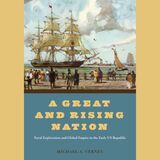6 books about Manifesto

Barbaric Others
A Manifesto on Western Racism
Ziauddin Sardar
Pluto Press, 1993
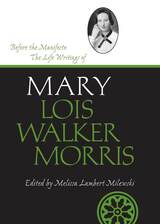
Before the Manifesto
The Life Writings of Mary Lois Walker Morris
Melissa Lambert Milewski
Utah State University Press, 2007
Mary Lois Walker Morris was a Mormon woman who challenged both American ideas about marriage and the U.S. legal system. Before the Manifesto provides a glimpse into her world as the polygamous wife of a prominent Salt Lake City businessman, during a time of great transition in Utah. This account of her life as a convert, milliner, active community member, mother, and wife begins in England, where her family joined the Mormon church, details her journey across the plains, and describes life in Utah in the 1880s. Her experiences were unusual as, following her first husband's deathbed request, she married his brother, as a plural wife, in the Old Testament tradition of levirate marriage.
Mary Morris's memoir frames her 1879 to 1887 diary with both reflections on earlier years and passages that parallel entries in the day book, giving readers a better understanding of how she retrospectively saw her life. The thoroughly annotated diary offers the daily experience of a woman who kept a largely self-sufficient household, had a wide social network, ran her own business, wrote poetry, and was intellectually curious. The years of "the Raid" (federal prosecution of polygamists) led Mary and Elias Morris to hide their marriage on "the underground," and her to perjury in court during Elias's trial for unlawful cohabitation. The book ends with Mary Lois's arrival at the Salt Lake Depot after three years in exile in Mexico with a polygamist colony.
Mary Morris's memoir frames her 1879 to 1887 diary with both reflections on earlier years and passages that parallel entries in the day book, giving readers a better understanding of how she retrospectively saw her life. The thoroughly annotated diary offers the daily experience of a woman who kept a largely self-sufficient household, had a wide social network, ran her own business, wrote poetry, and was intellectually curious. The years of "the Raid" (federal prosecution of polygamists) led Mary and Elias Morris to hide their marriage on "the underground," and her to perjury in court during Elias's trial for unlawful cohabitation. The book ends with Mary Lois's arrival at the Salt Lake Depot after three years in exile in Mexico with a polygamist colony.
[more]
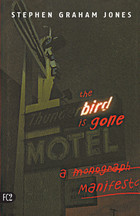
The Bird is Gone
A Manifesto
Stephen Graham Jones
University of Alabama Press, 2003
Imagine a world where the American government signed a conservation act to "restore all indigenous flora and fauna to the Great Plains," which means suddenly the Great Plains are Indian again. Now fast-forward fourteen years to a bowling alley deep in the Indian Territories. People that bowling alley with characters named LP Deal, Cat Stand, Mary Boy, Courtney Peltdowne, Back Iron, Denim Horse, Naitche, and give them a chance to find a treaty signed under duress by General Sherman, which effectively gives all of the Americas back to the Indians, only hide that treaty in a stolen pipe, put it in a locker, and flush the key down the toilet. Ask LP Deal and the rest what they will trade to get that key back--maybe, everything.
[more]
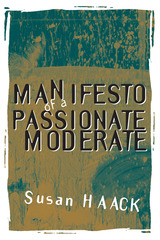
Manifesto of a Passionate Moderate
Unfashionable Essays
Susan Haack
University of Chicago Press, 1998
Forthright and wryly humorous, philosopher Susan Haack deploys her penetrating analytic skills on some of the most highly charged cultural and social debates of recent years. Relativism, multiculturalism, feminism, affirmative action, pragmatisms old and new, science, literature, the future of the academy and of philosophy itself—all come under her keen scrutiny in Manifesto of a Passionate Moderate.
"The virtue of Haack's book, and I mean virtue in the ethical sense, is that it embodies the attitude that it exalts. . . Haack's voice is urbane, sensible, passionate—the voice of philosophy that matters. How good to hear it again."—Jonathan Rauch, Reason
"A tough mind, confident of its power, making an art of logic . . . a cool mastery."—Paul R. Gross, Wilson Quarterly
"Few people are better able to defend the notion of truth, and in strong, clear prose, than Susan Haack . . . a philosopher of great distinction."—Hugh Lloyd-Jones, National Review
"If you relish acute observation and straight talk, this is a book to read."—Key Reporter (Phi Beta Kappa)
"Everywhere in this book there is the refreshing breeze of common sense, patiently but inexorably blowing."—Roger Kimball, Times Literary Supplement
"A refreshing alternative to the extremism that characterizes so much rhetoric today."—Kirkus Reviews
"The virtue of Haack's book, and I mean virtue in the ethical sense, is that it embodies the attitude that it exalts. . . Haack's voice is urbane, sensible, passionate—the voice of philosophy that matters. How good to hear it again."—Jonathan Rauch, Reason
"A tough mind, confident of its power, making an art of logic . . . a cool mastery."—Paul R. Gross, Wilson Quarterly
"Few people are better able to defend the notion of truth, and in strong, clear prose, than Susan Haack . . . a philosopher of great distinction."—Hugh Lloyd-Jones, National Review
"If you relish acute observation and straight talk, this is a book to read."—Key Reporter (Phi Beta Kappa)
"Everywhere in this book there is the refreshing breeze of common sense, patiently but inexorably blowing."—Roger Kimball, Times Literary Supplement
"A refreshing alternative to the extremism that characterizes so much rhetoric today."—Kirkus Reviews
[more]
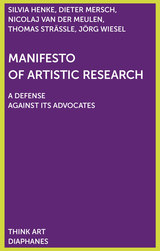
Manifesto of Artistic Research
Silvia Henke, Dieter Mersch, Nicolaj van der Meulen, Thomas Strässle, and Jörg Wiesel
Diaphanes, 2020
Since its beginnings in the 1990s, artistic research has become established as a new format in the areas of educational and institutional policy, aesthetics, and art theory. It has now diffused into almost all artistic fields, from installation to experimental formats to contemporary music, literature, dance, or performance art. But from its beginnings—under labels like “art and science” or “scienceart” or “artscience” that mention both disciplines in one breath—it has been in competition with academic research, without its own concept of research having been adequately clarified. This manifesto attempts to resolve the problem and to defend the term. Further, this manifesto defends the radical potential of artistic research against those who toy all too carefully with university formats, wishing to ally their work with scientific principles. Its aim is to emphasize the autonomy and particular intellectuality of artistic research, without seeking to justify its legitimacy or adopt alien standards.
[more]
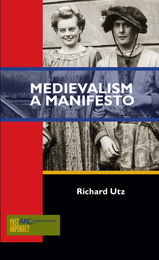
Medievalism
A Manifesto
Richard Utz
Arc Humanities Press, 2017
This book is called a manifesto because it has an unapologetically political objective. Richard Utz wants to help reform the way we think about and practise our academic engagement with medieval culture, and he uses his own observations as a medievalist and medievalism-ist over the last twenty-five years to offer ways in which we might reconnect with the general public that has allowed us to become, since the late nineteenth century, a rather exclusive clan of specialists who communicate mostly with each other.The traditional academic study of the Middle Ages, after more than a century of growing and plateauing, is now on the decline. While, at least over the next five to ten years, we will still be basking in the reassuring proximity (at conferences) of thousands of others who are involved in what we do ourselves, there is a manifest discrepancy between the large number of students who request that we address their love of Harry Potter, Lord of the Rings, Game of Thrones, and medieval-themed video and computer games, and the decreasing number of actual medievalists hired to replace retiring colleagues. We should pursue more lasting partnerships with so-called amateurs and enthusiasts for the sake of a sustainable future engagement with medieval culture. Richard Utz suggests some ways we might do this, and looks forward to “a more truly co-disciplinary, inclusive, democratic, and humanistic engagement with what we call, for better or worse, the Middle Ages”.
[more]
READERS
Browse our collection.
PUBLISHERS
See BiblioVault's publisher services.
STUDENT SERVICES
Files for college accessibility offices.
UChicago Accessibility Resources
home | accessibility | search | about | contact us
BiblioVault ® 2001 - 2024
The University of Chicago Press




